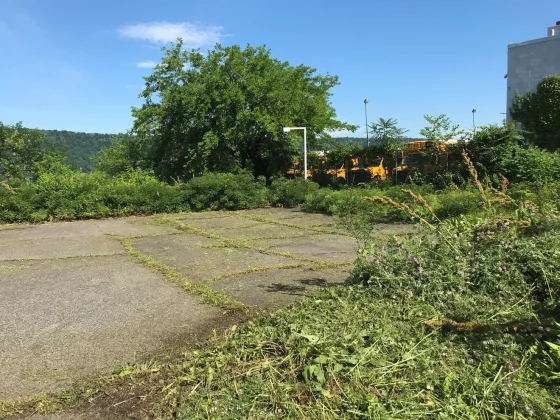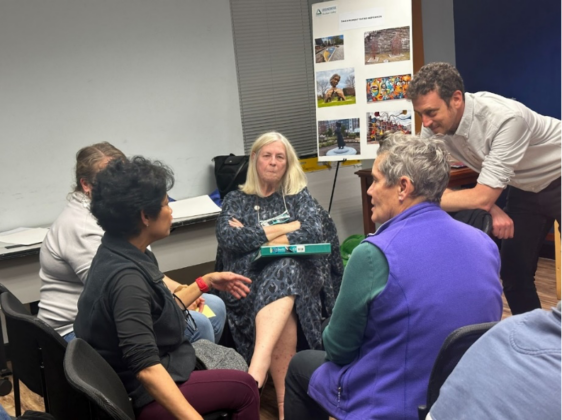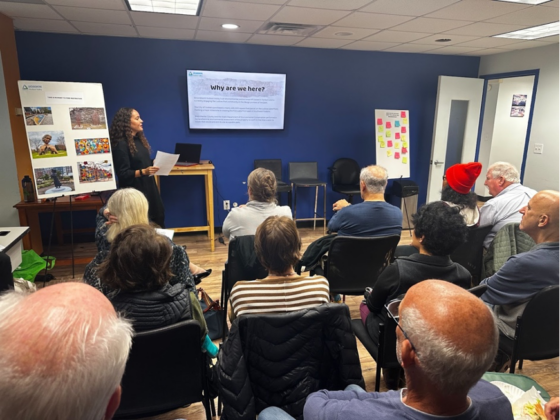
Over a century ago, the City of Yonkers designated a site in the Ludlow Park neighborhood for commercial and industrial use. Currently in use as a bus parking lot, the City has its eyes on the site for the creation of the first waterfront park in the neighborhood. Located in the heart of the Ludlow Park community in Yonkers, this new park project has the potential to bring green space and recreation opportunities to a community that has been disconnected from the Hudson River for generations.
To capture residents’ dreams for the space and raise their priorities and concerns, the city partnered with Groundwork Hudson Valley (GWHV) to implement an extensive community engagement plan.
GWHV has been leading the charge on community engagement in Southwest Yonkers for over 20 years, elevating community voices in their land revitalization and green infrastructure efforts to ensure their work positively impacts the most vulnerable residents. Most recently, the City of Yonkers included many community priorities raised by GWHV’s Climate Safe Yonkers Task Force in its first-ever climate action.
engaging new community perspectives
For the Ludlow Park renovation, GWHV took a two-pronged approach to outreach. First, they broadly engaged the wider community of potential park visitors and then narrowed and deepened their engagement efforts with residents living in the neighborhoods surrounding the site. This meant utilizing multiple platforms to collect community input and incorporating a wide range of topics into the engagement strategy to appeal to different groups of residents.
To reach as broad of an audience of potential park users as possible, GWHV used both in-person and digital tools to meet people where they are and make providing feedback as easy as possible. The team joined a community meeting hosted by representatives from the Yonkers City Council, discussing the overarching community engagement process, answering questions, and explaining how residents could share their input on Ludlow Park with the City. They did in-person canvassing at community centers, engagement events, and local schools and distributed an online survey via its weekly newsletter, social media, and paper flyers at various businesses, community centers, and events. The survey focused on three overarching categories. Collectively, over 300 Yonkers residents completed the survey about their hopes for the new waterfront park.
To collect feedback from the residents surrounding the park site, GWHV knew they had to think differently about how people might connect with the space. Not everyone is a “park person,” but everyone in the neighborhood has a stake in the vision for their neighborhood. Knowing they had to think beyond environmental and climate concerns, GWHV collaborated with partners to integrate history, culture, and reflection into the conversation about land reuse.
In partnership with the National Park Service Rivers, Trails, and Conservation Assistance Program (NPS-RTCA), historians from Philipse Manor Hall State Historic Site, and the City of Yonkers, GWHV organized the “Roots and Reflections: Explore the Ludlow Park History” workshop. This workshop brought together an intergenerational coalition of community leaders, members of GWHV’s Green Team (an environmental education and employment program for high-school-aged youth), and city officials told learn about the history of the local Ludlow Park area, including the Indigenous history, and envision what it could look like to think beyond just the natural features of the space and integrate features that meet the broader needs of the community.

From this workshop, participants generated a comprehensive wish list for the new development in the Ludlow Park neighborhood that bridged nature, culture, and community-building:
- Restoring the natural shoreline with native plants and pollinators to preserve the area’s natural ecology.
- Incorporating benches, jungle gyms, an interactive pier, and a community pavilion to create multifunctional spaces for recreation and socializing.
- Celebrating the history of the land through historical visuals of the park and Yonkers, an interactive map of the Ludlow Park neighborhood, a mosaic path, and a walkable timeline, and designate a section of the park to pre-colonial Yonkers and the Lenape people.
This workshop, and the broader engagement strategy, attracted many new faces from the Yonkers community, beyond the regular participants familiar with GWHV’s previous community engagement efforts. GWHV’s Director of Community Engagement and Communications, Candida Rodriguez, explained, “I think it was the angle we had taken that hit home. Instead of just focusing on the environment, we brought in more cultural and historical perspectives that resonated with the community. It showed us that there are unconventional ways to achieve climate resilience. Engaging in conversations with people where different perspectives are shared, you can present a different point of view on a project that maybe they haven’t thought of, which can be very successful.”

The positive reception of the Ludlow Park community engagement process in Yonkers demonstrated that thinking creatively about how people relate to places is a necessary component of equitable climate action. By adding historical and cultural perspectives into community outreach, GWHV brought more residents into the land use conversation, fostering deeper connections between people and their environment. Community-centered climate resilience work requires this kind of outside-the-box thinking, and GWHV is dedicated to making this a cornerstone of their work moving forward.
To learn more, visit Groundwork Hudson Valley.
